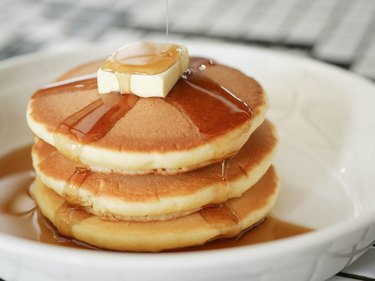
Getting a good head start on your day means eating a healthy breakfast, but with so many choices, finding smart choices can be confusing. Pancakes are a hearty breakfast food, providing a high quantity of carbohydrates and a range of vitamins and minerals. However, pancakes can also be relatively high in fat, calories and sodium. With careful meal planning, you can include an occasional serving of pancakes in your diet. Even if you have a wheat gluten allergy, there are some alternatives available to you.
Tip
Pancakes definitely aren't the healthiest breakfast option available, due largely to their fat, salt and sodium content. But with some planning, you may be able to include them as an occasional breakfast treat in your nutrition plan.
Video of the Day
Basic Pancake Nutrition
An ideal breakfast contains 350 to 500 calories, depending on your nutritional needs. A 3.5-ounce serving of pancakes has 221 calories, although the common practice of adding butter and maple syrup adds calories and fat. While extra calories will not typically put pancakes off the menu, the additional fat may. A serving of pancakes contains 8.8 grams (g) of fat, and piling on more fat may not work within your meal plan. Roughly half of the fat in pancakes is from saturated fat: 3.9 g. A serving of pancakes contains 27.2 g of carbohydrates, or 8.3 to 12 percent of the amount you need in a single day. You also get 8.1 g of protein, an amount that contributes 14.4 to 17.6 percent of the suggested intake.
Video of the Day
Tip
According to Health.gov's Dietary Guidelines for Americans, 2015-2020, you should avoid taking in more than 10 percent of your daily calories in saturated fat. If the 3.9 grams of saturated fat in pancakes puts you over the edge, consider trying a low calorie pancakes recipe.
Sugar and Sodium
Pancakes have both a savory and a sweet taste; the sweetness is from the addition of granulated sugar in the recipe. A serving of pancakes contains 4.3 g of sugar, but adding maple sugar on your pancakes adds quite a bit more. Health.gov's Dietary Guidelines for Americans 2015-2020 recommends limiting your sugar intake to less than 10 percent of your daily calories. You can sweeten pancakes with fresh fruit rather than syrup to keep your sugar intake low. Due to the salt in pancake batter, you also consume 308 milligrams (mg) of sodium per serving. The recommended daily limit stands at 1,500 to 2,300 mg, so carefully plan consumption of sodium throughout your day to avoid going over the suggested limit.
Vitamins and Minerals
A serving of pancakes is a good source of phosphorus and calcium, with 20 percent and 18 percent of the daily recommended intake, respectively. This makes pancakes a smart option for boosting bone strength and your body's ability to make RNA and DNA. Pancakes serve up 12 percent of the iodine and riboflavin you need each day as well, and you'll take in smaller quantities of vitamin C, thiamin, vitamin B6, niacin, vitamin B12, magnesium, zinc, copper and iron.
Alternatives to Pancakes
Whole-wheat pancakes provide extra fiber and a serving of whole grains. Anyone with an intolerance to wheat gluten should avoid pancakes made with wheat flour, but you can make changes to put pancakes back in your meal plan. With a few tweaks to your recipe (or purchasing a pre-made mix), you can have pancakes made of flour from gluten-free grains such as quinoa, rice and corn. These alternatives offer good texture and protein and it should not trigger symptoms of celiac disease, a medical condition marked by an intolerance to wheat gluten. Buckwheat is also gluten-free and can be made into delicious pancakes, despite the "wheaty" sounding name.
- Fitbit: Pancake
- Go Ask Alice!; Breakfast: The First Chance to Fill Your Tank; Feb. 25, 2005
- McKinely Health Center; Macronutrients: the Importance of Carbohydrate, Protein, and Fat; March 2008
- Cleveland Clinic; Eating Too Much Sugar? It's Time to Tame Your Sweet Tooth; Melissa Ohlson; December 2009
- Centers for Disease Control and Prevention; Americans Consume Too Much Sodium; Feb. 23, 2011
- Health.gov: Dietary Guidelines for Americans 2015-2020 Key Recommendations